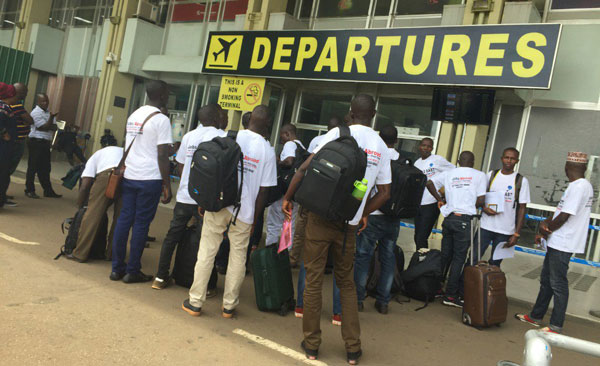
Entebbe, Uganda | THE INDEPENDENT | Lawyer Michael Aboneka wants an explanation of the various services air bound passengers pay for as they pass through Entebbe International Airport. This stems from his complaint that he paid departure tax while exiting Entebbe Airport last year.
“It is a parliamentary resolution, not a law. So the government must refund the money I paid as departure tax last year,” Aboneka says.
Over 1,500 passengers leave daily via Entebbe Airport with the full resumption of Uganda’s economy and easing of travel restrictions as part of the COVID-19 containment measures. In September last year, the parliamentary Committee on Trade and Industry introduced the departure tax.
“The committee proposed a levy of US$ 10 on every person who departs from Uganda by air transport, ” the chairperson Mwine Mpaka said while presenting a report. He noted that the fee, dubbed Tourism Development Levy, was one of the ways to revive the industry that was hit hard by the COVID-19 pandemic.
Mwine explained that 70 per cent of the proceeds from the levy would be used to bail out tourism companies struggling financially, while the rest will be used to develop the country’s tourism sites and attractions and market Uganda globally.
He noted that tourism was contributing US$1.6b annually in foreign exchange, 500,000 jobs and contributing 8% to Uganda’s GDP before the advent of COVID-19. Parliament approved the proposal and how the proceeds should be utilized.
Aboneka has now asked the government, through the Attorney General and Uganda Civil Aviation Authority-UCAA, to refund the monies he allegedly paid as departure tax.
In his January 27, 2022 notice, Aboneka says that he paid US$ 40 US per trip outside Uganda between September and November 2021. In this period, Aboneka says he made four trips aboard Uganda Airlines, Kenya Airways and Ethiopian Airlines and as a result, he is demanding a refund of US $ 1,600, approximately Shillings 5.6million.
He claims that airlines are charging departure tax of US$ 40 about Shillings 140,000 and yet there is no law providing for it.
Aboneka has also asked UCAA and the Ministry of Works and Transport to ensure airlines have harmonized service fee charges such as passenger handling fees and maintenance fees.
Vianney Luggya, the UCAA spokesperson says airlines are not collecting departure tax but rather charging for various services namely passenger service charges that ae US$ 50 (Sh176,000). He explains that airport charges are guided by the International Civil Aviation Organisation’s (ICAOs) Policies on Charges for Airports and Air Navigation Services (Doc 9082).
ICAO encourages States to put into consideration four key charging principles; non-discrimination, cost relatedness, transparency and consultation with users into their national legislation, regulation or policies, as well as into their future air services agreements, in order to ensure compliance by airport operators and air navigation services providers (ANSPs).
“The Charge is directly associated with the services offered to the users and not for general security. It is also important to note that charges are different from taxes,” Luggya said. The ICAO Council considered this and described a charge as a levy that is designed and applied specifically to recover the costs of providing facilities and services for civil aviation while a tax is a levy that is designed to raise national or local government revenues, which are generally not applied to civil aviation in their entirety or on a cost-specific basis.
“The payments relating to security are purely charges as defined by ICAO and are intended for cost recovery so they are not taxes as insinuated,” Luggya said. But Aboneka insists that airlines collected departure tax four times while he exited Entebbe Airport.
Shakira Rahim, the spokesperson of Uganda Airlines, says that they are charging legal fees, as prescribed by UCAA.
“The tickets clearly indicate Departure Tax (not charges). What is the process of coming up with these charges? How does UCAA come up with these charges? Is there a transparent process? They need to explain and break down every charge, what is the difference between maintenance charge and service fee charge! I find this ambiguous and a way to rip off passengers?” Aboneka asked.
Three passengers told our reporter that they have not paid the tax because they scrutinize their air tickets while four said they do not look into details of the air ticket receipts, but say it would be an issue of public concern if outgoing passengers are paying an illegal departure tax.
***
URN
 The Independent Uganda: You get the Truth we Pay the Price
The Independent Uganda: You get the Truth we Pay the Price





